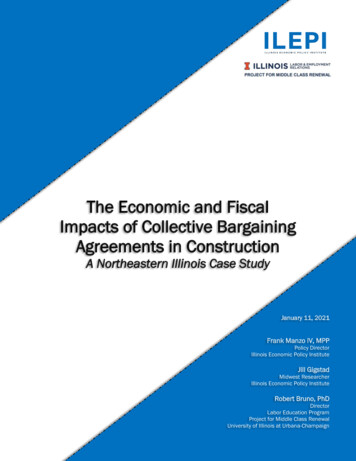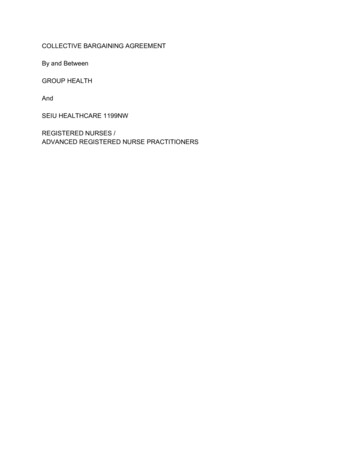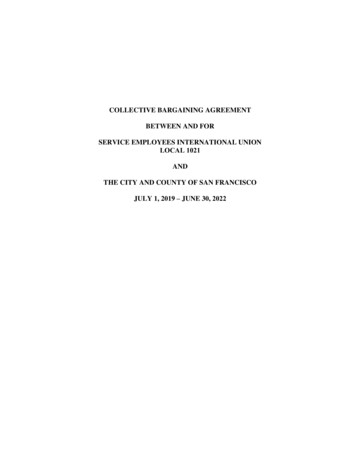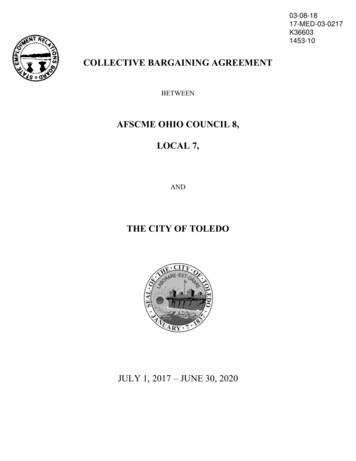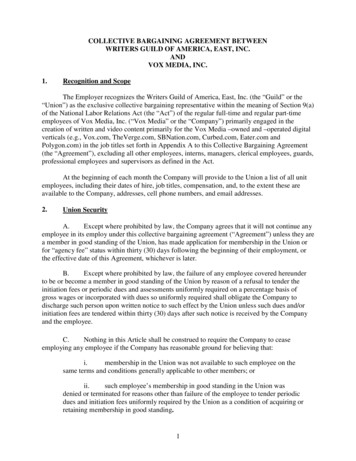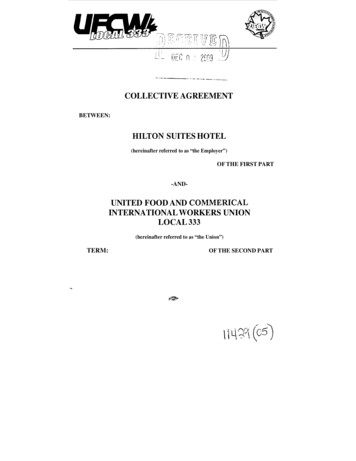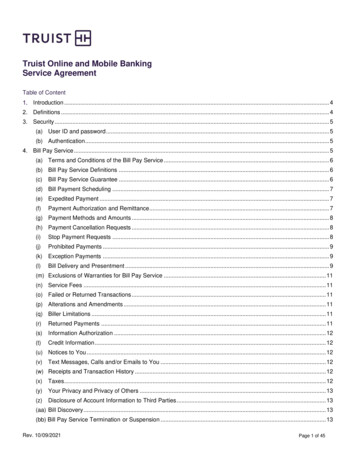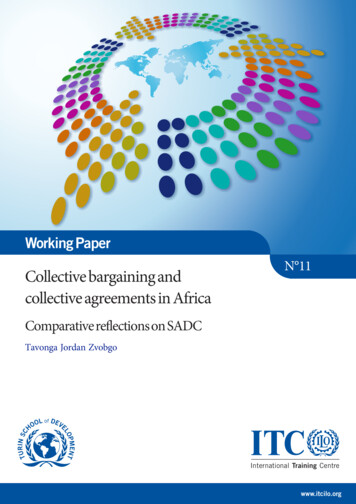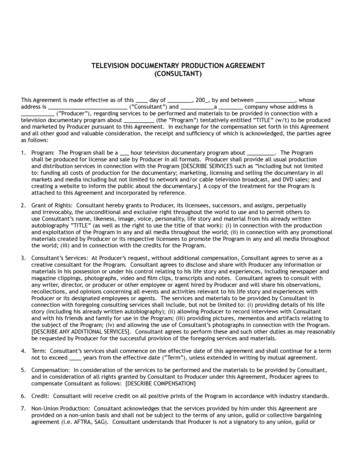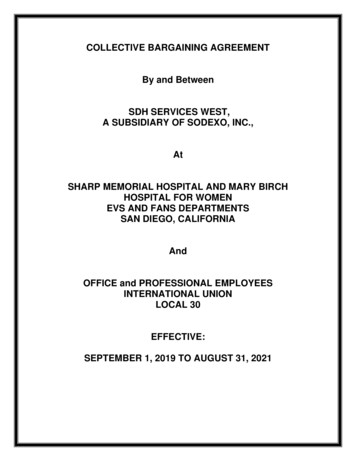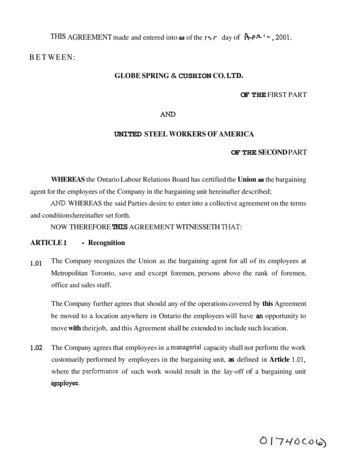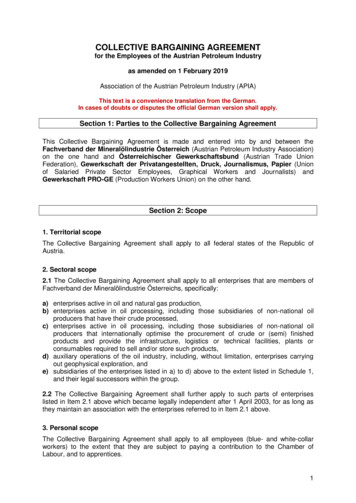
Transcription
COLLECTIVE BARGAINING AGREEMENTfor the Employees of the Austrian Petroleum Industryas amended on 1 February 2019Association of the Austrian Petroleum Industry (APIA)This text is a convenience translation from the German.In cases of doubts or disputes the official German version shall apply.Section 1: Parties to the Collective Bargaining AgreementThis Collective Bargaining Agreement is made and entered into by and between theFachverband der Mineralölindustrie Österreich (Austrian Petroleum Industry Association)on the one hand and Österreichischer Gewerkschaftsbund (Austrian Trade UnionFederation), Gewerkschaft der Privatangestellten, Druck, Journalismus, Papier (Unionof Salaried Private Sector Employees, Graphical Workers and Journalists) andGewerkschaft PRO-GE (Production Workers Union) on the other hand.Section 2: Scope1. Territorial scopeThe Collective Bargaining Agreement shall apply to all federal states of the Republic ofAustria.2. Sectoral scope2.1 The Collective Bargaining Agreement shall apply to all enterprises that are members ofFachverband der Mineralölindustrie Österreichs, specifically:a) enterprises active in oil and natural gas production,b) enterprises active in oil processing, including those subsidiaries of non-national oilproducers that have their crude processed,c) enterprises active in oil processing, including those subsidiaries of non-national oilproducers that internationally optimise the procurement of crude or (semi) finishedproducts and provide the infrastructure, logistics or technical facilities, plants orconsumables required to sell and/or store such products,d) auxiliary operations of the oil industry, including, without limitation, enterprises carryingout geophysical exploration, ande) subsidiaries of the enterprises listed in a) to d) above to the extent listed in Schedule 1,and their legal successors within the group.2.2 The Collective Bargaining Agreement shall further apply to such parts of enterpriseslisted in Item 2.1 above which became legally independent after 1 April 2003, for as long asthey maintain an association with the enterprises referred to in Item 2.1 above.3. Personal scopeThe Collective Bargaining Agreement shall apply to all employees (blue- and white-collarworkers) to the extent that they are subject to paying a contribution to the Chamber ofLabour, and to apprentices.1
The Collective Bargaining Agreement shall not apply to holiday interns. Holiday interns shallbe students who are temporarily employed for the purpose of vocational (technical,commercial or administrative) (preliminary) training in accordance with the public universitycurriculum. Compensation for such holiday interns shall be defined with the participation ofthe works council.The Collective Bargaining Agreement shall, moreover, not apply to persons who areemployed for the purpose of being occupationally trained within the above meaning, providedthat such circumstance has been expressly specified upon their entry and they are notemployed for more than six months (e.g. before starting on a university study course,between completing a Bachelor study course and starting on a Master study course, orbetween completing a Master study course and starting on a PhD study course). Theircompensation shall be regulated and their number determined with the participation of theworks council.4. Temporary agency workersSection 10 Arbeitskräfteüberlassungsgesetz (AÜG; Act Governing Temporary Agency Work)including relevant collective bargaining regulations shall apply provided that:– the hiring out before 1 April 2003,– the hiring out as of 1 April 2003 (for blue-collar workers as of 1 July 2003),– the hiring out as of 1 July 2007shall be considered equal to the commencement of an employment relationship as of therespective date.5. TermThe Collective Bargaining Agreement shall enter into force on 1 February 2019 and shallsupersede all previous collective bargaining agreements, especially the collective bargainingagreements for the white-collar workers (salaried employees) of the petroleum industry, theblue-collar workers (wage-earning employees) of the oil and natural gas producing industryand the blue-collar workers of the oil processing industry in Austria.The Collective Bargaining Agreement may be terminated by either party by registered lettersubject to three-months notice as of the last day of any month.Section 3: Commencement and Termination of Employment1. Trial periodA one month trial period may be agreed as a maximum, and either party shall be entitled toterminate such employment relationship at any time.2. Termination of employment relationship2.1 Period and date of noticeUpon expiry of the trial period the employment relationship may be terminated subject to thestatutory provisions and upon observance of the provisions set forth below. If noarrangement has been made that is more beneficial for the employee, the employee mayterminate the employment relationship on the last day of any calendar month – subject toone month’s notice. This period of notice may be extended for up to six months by individualagreement; however, the notice period to be observed by the employer shall not be shorterthan the termination period agreed with the employee.2
The employer may terminate the employment relationship, subject to the statutory provisionsand upon observance of the periods set forth below, on the last day of a calendar month by anotice of termination (“Kündigung”):Periods of termination depending on years of uninterrupted employment with the employer:up to 2 years6 weeks,more than 2 years2 months,more than 5 years3 months,more than 15 years4 months,more than 25 years5 months.The following regulation shall apply for employees who are not governed by theAngestelltengesetz (AngG; Act Governing White-Collar Workers):Pursuant to Para 3 of Section 1159 ABGB (Federal Law Gazette 153/2017), the last day ofany calendar month shall apply as the date of termination agreed in advance for all existingand future employment relationships. This regulation shall apply for an indefinite period andtherefore shall continue beyond the date on which Para 3 of Section 1159 ABGB (FederalLaw Gazette 153/2017) becomes effective on 1 January 2021.Employees who are governed by the Angestelltengesetz (AngG; Act Governing White-CollarWorkers) and who entered employment prior to 1 April 2003 shall be governed by thefollowing provision:If no agreement within the meaning of the last half-sentence of Para 3 of Section 20 AngGhas been made, the employment relationship may be terminated by the employer only as ofexpiry of a calendar quarter.2.2 Waiver of performanceIf the employer waives performance of the employee during the period of notice, such waivershall not reduce the employee’s remuneration.2.3 Entitlement to time off when notice is given by the employer and time lapseIf the employment relationship is terminated by notice by the employer and time lapse, theemployee (except when his/her performance is waived) shall be entitled during the (fictitious)period of notice to claim at least one free working day per working week, but not less than 8(eight) hours, while remuneration continues to be paid. This shall be calculated analogouslyto Item 2 of Section 14 below. Termination upon the employee’s retirement shall be governedby Paras 2 and 3 of Section 22 AngG and Paras 2 and 3 of Section 1160 Allgemeinesbürgerliches Gesetzbuch (ABGB; Austrian Civil Code).In the case of shift work, these provisions shall apply mutatis mutandis. The day on whichsuch time off shall be consumed shall be agreed between the parties. If no agreement canbe reached the last 8 (eight) hours of the working week shall be free.3. Obligation to keep apprentices after completion of their apprenticeshipUpon proper completion of the apprenticeship period, apprentices shall continue to beemployed for 6 (six) months; if this period of extension does not end on the last day of acalendar month, it shall be extended to such last day. If the employer does not wish tocontinue the employment relationship beyond such period of extension, the employer shallterminate it at six-months’ notice at the end of the period of extension as defined in theprevious sentence.4. Notification in the case of employment relationships of limited durationIf the employee, in the course of an employment relationship of limited duration, fails to notifythat s/he does not wish to continue the employment relationship beyond the limited duration,3
or if no clarity is achieved in advance that an extension of the employment relationship oflimited duration is not intended, the intent not to continue an employment relationship limitedby an expiry period and continuing for more than two months (including a trial month, if any)shall be notified to the employee not later than 2 (two) weeks before expiry of the period. Ifno such notification is given or is given too late the remuneration due for 3 (three) days shallbe paid beyond the employment relationship terminated by expiry of the period, incompensation for the time off not consumed (at the occasion of the termination of anemployment relationship).5. Payment of wages/salary in the case of deathIf the employment relationship is dissolved by the death of the employee, the wages/salaryfor the month in which such death occurred and the following month shall be paid when theemployment relationship had been existent for more than 1 (one) year. If the employmentrelationship had been existent for more than 5 (five) years at the time of death, thewages/salary shall be paid for the month in which such death occurred and the following twomonths.If the employee, at the time of his/her death, had no or only a limited claim for remuneration,then the full amount of the wages/salary as defined in the previous paragraph shall be paidas of the day of his/her death.For the period of continued payment of wages/salary, the pro rata shares of the 13 th(thirteenth) and 14th (fourteenth) monthly payments due shall be similarly due and payable.Entitlement to such claims shall be due to the legal heirs who the deceased had been legallyobliged to maintain. The eligible heirs of employees whose employment relationship hadbeen commenced up to and including 31 December 2002 shall have the choice of eithercontinued payment of wages/salary or a severance payment which may be due under Para 6of Section 23 AngG combined with the Arbeiter-Abfertigungsgesetz (ArbAbfG; Act GoverningSeverance Pay for Blue-collar Workers) or Item 6 of Section 3 of this Collective BargainingAgreement.6. Severance pay6.1 Severance pay if the employee claims early retirement after long insurance periodspursuant to Section 253 Allgemeines Sozialversicherungsgesetz (ASVG; GeneralSocial Insurance Act)Further to the provisions of the AngG, employees shall be entitled to severance pay also inthose cases where men having completed the 65th (sixty-fifth) year of their life and womenhaving completed the 60th (sixtieth) year of their life, or upon claiming early retirement afterlong insurance periods pursuant to Section 253b ASVG or Article X Nachtschwerarbeitsgesetz (NSchG; Act Governing Heavy Work at Night) will themselves give notice. In suchcases, Para 1 of Section 23a AngG combined with ArbAbfG shall apply mutatis mutandiswith the following additions.The employee shall be entitled to severance pay provided that s/he gives notice subject tosuch notice period and notice date as the employee would have to observe on the basis ofhis/her employment contract or, if no agreement has been made, Para 2 of Section 20 AngGor Item 2.1 of Section 3 of this Collective Bargaining Agreement, and provided that suchemployee has been employed without any interruption by the enterprise for at least 5 (five)years (Section 4) prior to termination of the employment relationship. In calculating such 5(five) year period, any periods of employment with the same employer as a blue-collarworker prior to employment as a white-collar worker shall be included.6.2 Severance pay in the event of deathIf the legal heirs whose maintenance was a legal obligation of the deceased include minorswho had not yet completed their 18th (eighteenth) year of life at the date of the employee’sdecease, the entitlement under Para 6 of Section 23 AngG combined with ArbAbfGincreases to the full severance pay. The same shall apply when such heirs, while having4
completed their 18th (eighteenth) year of life are still in a vocational training relationship andare entitled to family allowance under Item b) of Para 1 of Section 2 Familienlastenausgleichsgesetz (Family Burden Equalisation Act). The latter provision shall also apply whenthe vocational training relationship is interrupted due to a holiday internship and no familyallowance is granted during such period.If the deceased at the date of his/her death leaves a spouse, civil partner within the meaningof the Act Governing Civil Partnerships (EPG) but no minor within the meaning of the aboveparagraph, the entitlement under Para 6 of Section 23 AngG combined with ArbAbfG to halfthe severance pay increases to the full severance pay. This entitlement shall exist regardlessof whether or not the surviving spouse or civil partner within the meaning of EPG was entitledto maintenance pay at the time of the employee’s death. A prerequisite, however, shall bethat the marriage or civil partnership had continued for 3 (three) years at the time of theemployee’s death.6.3 Payment of severance payThe severance pay shall be paid upon termination of the employment relationship togetherwith the normal wage/salary settlement. If the employer cannot reasonably, on economicgrounds, be expected to pay the severance pay in a single instalment, payment may bemade pursuant to Para 4 of Section 23 AngG combined with ArbAbfG.6.4 Crediting of other benefitsFor the period corresponding to the duration of severance pay, other benefits such aspension grants, company pensions and similar allowances which would otherwise be paid bythe employer or a beneficiary institution maintained by the employer (such as a pension fund)shall be suspended.6.5 Calculation of severance pay for the transition from full- to part-time employmentIf, within ten years (provided that the employment relationship was established before or on30 June 2002 and the Betriebliches Mitarbeitervorsorgegesetz (BMVG; Act GoverningEmployee Retirement and Severance Pay Provision) is not applicable) prior to termination ofthe employment relationship, part-time employment rather than full-time employment isagreed with the employee, the remuneration from full-time employment shall be consideredalong the following lines in calculating the severance pay: First determine the number ofmonths eligible for severance pay based on the employee’s overall employment period. Nextcalculate the pro rata share of part- and full-time employment within the scope of the entireemployment relationship. Apportion the number of monthly remunerations in line with theratio thus determined. Using this apportionment, determine the severance pay shares brokendown by the monthly calculation base for full- and part-time employment and calculate theoverall severance pay.In order to calculate the assessment base for full-time employment, the last monthlyremuneration for part-time employment shall be revalued appropriately (actual hours workedper week as a ratio of normal working hours upon termination of the employmentrelationship). The monthly remuneration thus revalued shall be reduced by the rise in themonthly wage/salary granted in connection with and founded through the change to part-timeemployment. If works agreements or, if no works council has been established, individualagreements have been concluded other equivalent regulations may be agreed regarding theaccounting for full-time employment.If any law regulating severance pay on the change from full- to part-time employment shouldbe passed, negotiations shall be held on amending this Collective Bargaining Agreement.These provisions shall apply mutatis mutandis for those cases where a reduction in part-timeemployment is agreed.Shorter normal working hours than those under the Collective Bargaining Agreement shallnot be considered as part-time when they apply to the entire operation or parts of theoperation and do not substantially deviate from the normal operational working hours.5
6.6 Changeover to the “New Severance Pay” schemeIf the employer and employee agree on a changeover from the severance pay regulation ofthe AngG/ArbAbfG to that set out in the BMVG, the employee shall be entitled to rescind,without stating any reasons, such agreement within one month of signing the changeoveragreement. This shall not apply if the wording of the changeover agreement has beendetermined by a works agreement pursuant to Item 26 of Para 1 of Section 97Arbeitsverfassungsgesetz (ArbVG; Industrial Relations Act) (defining the framework forchangeover to the severance pay regulations of the BMVG).Section 4: Length of Service With the Enterprise and Parental Leave Spells1. Length of service with the enterpriseThe length of service shall be calculated by adding all periods of employment with the sameenterprise which are not interrupted by more than 60 (sixty) days at a spell. This provisionshall not apply to cases where the employment relationship was terminated due to theemployee’s fault.2. Crediting of parental leave spellsParental leave spells during an employment relationship within the meaning of theMutterschutzgesetz (MSchG; Act Governing Protection of Expectant and Nursing Mothers),Eltern-Karenzurlaubsgesetz (EKUK; Parental Leave Act) or Väter-Karenzgesetz (VKG; ActGoverning Paternal Leave) which have commenced prior to 1 February 2013 shall becredited for a maximum of altogether 22 (twenty-two) months in calculating the period ofnotice, the duration of eligibility for sickness benefit, the sickness benefit supplement, theholiday leave, anniversary bonus, in calculating the amount of severance pay and for the five(5) year employment period for parents quitting within the meaning of Section 23a AngGcombined with Section 2 ArbAbfG.Regarding the crediting of parental leave spells commenced on or after 1 February 2013, thefollowing shall apply:Parental leave spells during an employment relationship within the meaning of the MSchG,EKUG or VKG shall be credited for a maximum of altogether 32 (thirty-two) months incalculating the period of notice, the duration of eligibility for sickness benefit, the sicknessbenefit supplement, the holiday leave, anniversary bonus, in calculating the amount ofseverance pay and for the 5 (five) year employment period for parents quitting within themeaning of Section 23a AngG combined with Section 2 ArbbfG.Parental leave spells commenced prior to 1 February 2013 and parental leave spellscommenced later shall be credited altogether for a maximum of 32 (thirty-two) months.Parental leave spells during an employment relationship within the meaning of the MschG,EKUG or VKG which started after 1 February 2017 shall be fully credited to claims thatdepend on the period of employment. The provision of Item 1.6 of Section 9 shall be withoutprejudice for parental leave spells commenced up to 31 January 2018.3. Where parental leave has been claimed up to, at most, the child’s second birthday, theemployer shall inform, in writing, the parent on parental leave during the 6th (sixth) or 5th (fifth)month prior to the end of such parental leave, to the address last notified, at which date theparental leave ends.6
If no such notification is given and if the parent has not quitted pursuant to Para 3 or Para 4of Section 23a AngG combined with Section 2 ArbAbfG, the employee may return to work upto four weeks after such notification as defined above is subsequently given (not later thanupon expiry of the entitlement to child-care benefit) or quit within two weeks of suchnotification; in this case the employee is entitled to severance pay pursuant to Para 3 andPara 4 of Section 23a AngG combined with Section 2 ArbAbfG, except when the BMVGapplies.Nonperformance between the expiry of the statutory parental leave period and the return towork within the meaning of the above provision shall not be deemed a breach of duty. Theemployee shall not be entitled to any protection against dismissal beyond that provided bylaw.This regulation shall apply to parental leave spells terminating after 31 August 2004.Section 5: Working Hours1. Normal weekly working hoursThe normal weekly working hours, excluding breaks, shall be 38 (thirty-eight) hours, whichfor apprentices shall include the time required for attending vocational school.1.1 Work on SaturdaysIn the case of a five-day working week, Saturday shall be no working day in operations ordepartments with no shift work.1.2 Weekly working hours for youthsUnder Para 2 of Section 11 Kinder- und Jugendlichen-Beschäftigungsgesetz (KJBG;Employment of Children and Youths Act), the weekly working hours of youths may be spreadacross working days in derogation of the provisions of Para 1 of Section 11 of the said Actregulating the daily working hours of youths. However, working hours per day shall notexceed 9 (nine) hours.1.3 Weekly working hours for fully continuous shift workThe weekly working hours for fully continuous shift work shall be 36 (thirty-six) hours onaverage.The weekly working hours for partly continuous shift work shall be 36 (thirty-six) hours onaverage provided that such shift work has been actually and permanently (for more than 24(twenty-four) weeks) established by way of shift schedules. The shift schedule must includeat least 6 (six) monthly night shifts extending beyond midnight throughout the wage/salarypayment period.Within the scope of the shift schedule, the individual worker must be concretely assigned toserving at least 5 (five) night shifts (regardless of whether continuous or not) within thewage/salary payment period.Employees who have completed their 55th (fifty-fifth) year and perform shift work within theabove meaning shall be entitled to one paid free shift within one calendar year. Wheneverpossible this paid free shift should be identical with a shift to build up credit time so as toensure a longer period of recreation.Such a shift must not be a Sunday or public holiday shift.2. Daily working hoursNormal daily working hours and any changes thereto shall be determined by agreement withthe works council with due regard of operational requirements and the provisions of the law.7
Provided that the total weekly working hours are spread evenly across 4 (four) days, normaldaily working hours may be extended to, at most, 10 (ten) hours by way of a worksagreement or, in enterprises with no works council, by individual agreements. Public holidaysmay not be used as non-working days.3. Working hours for multi-shift or continuous workIn the case of continuous or multi-shift work, the normal weekly working hours may beextended to, at most, 56 (fifty-six) hours within the scope of a shift schedule. The shiftschedule shall be drawn up so that within a given shift turn average weekly working hourswill not exceed 38 (thirty-eight) hours (36 (thirty-six) hours in the case of fully continuouswork). Within 2 (two) consecutive weeks, the normal working hours shall not exceed 96(ninety-six) hours. External to this shift schedule, an extension of these working hours maybe agreed in the event of an extraordinary workload by agreement with the works council or,in enterprises without a works council, upon the affected employee’s consent.3.1 Swing workers for shift workIn the case of continuous work, swing workers shall be used to ensure that each employeeon shift work will consume the time off due to him/her. For Sunday work a free day shall bedue in compensation each week. At least one Sunday per month shall remain free of work.4. Calculation period for single-shift operationIf required by an enterprise on a single-shift schedule, the normal weekly working hours maybe set, by a works agreement, at a bandwidth of 36 (thirty-six) to 40 (forty) hours anddistributed over a calculation period of 13 (thirteen) weeks at most so that the weeklyaverage does not exceed 38 (thirty-eight) hours. This calculation period may be extended to,at most, 26 (twenty-six) weeks by a works agreement which shall require the consent of theparties under the Collective Bargaining Agreement. Employees may work less than thenormal 36 (thirty-six) hours a week if such shorter hours serve as adjustment in the form ofwhole days.If adjustment is not possible for reasons beyond the employee’s control, the applicableovertime allowance shall be paid for any hours worked beyond 38 (thirty-eight) hours uponexpiry of the agreed period of time.In the case of adjustment in the form of whole days, the applicable overtime allowance shallbe paid for any work rendered on such days. The same shall apply if the employmentrelationship is terminated before the adjustment is consumed.4a. Authorisation under the Collective Bargaining Agreement for a differentdistribution of normal working hours in working hour modelsIn order to build up longer periods of consecutive time off a longer calculation period may beagreed for the distribution of normal working hours within the scope of working hour modelsby way of a works agreement or, in enterprises with no works council, by individualagreements. The details shall be specified in the works agreement or individual agreement.5. Building up credit hours in connection with public holidays5.1 In connection with public holidays, working hours may be shifted as provided in Section 4Arbeitszeitgesetz (AZG; Working Time Act) by a works agreement or, in enterprises withfewer than 5 (five) employees, by agreement with such employees.A credit period of not more than 52 (fifty-two) weeks may be agreed by a works agreementprovided that the working hours to be credited are, as a rule, distributed equally among theweeks of the credit period.8
5.2 If the employment relationship is terminated before the employee consumes suchcredited time (time off), the applicable overtime pay shall be due for such non-consumedtime. No entitlement to overtime allowance shall be due when the employment relationship isterminated due to unjustified premature quitting by the employee or dismissal with fault.6. Working hours for regular stand-by dutyEmployees covered by this Item whose employment relationship commenced prior to 1 April2003 and who worked/work in the oil and natural gas producing industry before and after 1April 2003, shall be due, after the 38th (thirty-eighth) or 36th (thirty-sixth) hour until the 48th(forty-eighth) hour, an allowance of 30% (thirty percent) in addition to the pay for normalhours.6.1 For day and night guards, day and night porters and works-employed fire fighters thenormal weekly working hours may be extended to, at most, 60 (sixty) hours; the normal dailyworking hours to, at most, 12 (twelve) hours, provided that such working hours include manyhours of stand-by duty on a regular basis.Any working hours beyond the normal working hours up to and including the 48th (fortyeighth) working hour shall be remunerated, in addition to the monthly wage/salary, by thenormal hourly wage/salary; as of the 49th (forty-ninth) working hour overtime pay shall bedue.6.2 Drivers (chauffeurs) and co-drivers of motor vehicles may be on duty for up to 14(fourteen) hours a day and up to 60 (sixty) hours a week provided such time includes manyhours of stand-by duty on a regular basis (Para 3 of Section 16 and Para 1 of Section 5AZG).If two drivers are in the vehicle, they may be on duty up to 17 (seventeen) hours a day andup to 60 (sixty) hours a week.Any working hours beyond the normal working hours up to and including the 48th (fortyeighth) hour of work shall be remunerated, in addition to the monthly wage/salary, by thenormal hourly wage/salary; as of the 49th (forty-ninth) working hour overtime pay shall bedue. Working hours on Sundays, public holidays and at night (8 pm to 6 am) shall also bedeemed overtime.The break from driving due to drivers of motor vehicles (tractor-trailers) of a maximumpermissible weight of more than 20 metric tons shall be one hour, and it may be substitutedby 2 (two) breaks of at least 30 minutes each.6.3 Notwithstanding the overtime permissible under Para 1 of Section 7 AZG and Section13b AZG, overtime service by drivers (chauffeurs) and co-drivers may be extended to, atmost, 10 (ten) further hours per week (Para 2 of Section 7 AZG). The employee must not beobliged to serve more than 10 (ten) hours of overtime per week.7. On-call dutyOn-call duty shall require works agreements. Existing in-house regulations shall remain validuntil a works agreement has been signed.8. Working hours on December 24 and 31December 24 and 31 shall be free of work in their entirety without any deduction fromwages/salaries.Employees who need to work on December 24 and 31 shall be due an allowance of 100%(hundred percent) for every hour worked during the normal working hours (excluding basicremuneration).9
Overtime worked on December 24 and 31 shall be paid by the basic remuneration plus anallowance of 100% (hundred percent). Overtime on these two days shall be deemed to bethose working hours that exceed the normal working hours agreed for the relevant weekday.Section 5a: Night Work1. Night work shall be permissible only when a written arrangement entered into voluntarily(“Dienstzettel”) has been made.If an employee rejects such an arrangement the employment relationship may not beterminated on such grounds; prima facie evidence shall suffice. Inadmissible terminationshall not apply if there is a greater likelihood for a motif furnished as prima facie evidence bythe employer.The employer may not plead ignorance of the rejection. Th
The Collective Bargaining Agreement shall apply to all federal states of the Republic of Austria. 2. Sectoral scope 2.1 The Collective Bargaining Agreement shall apply to all enterprises that are members of Fachverband der Mineralölindustrie Österreichs, specifically: a) enterprises active in oil and natural gas production,
